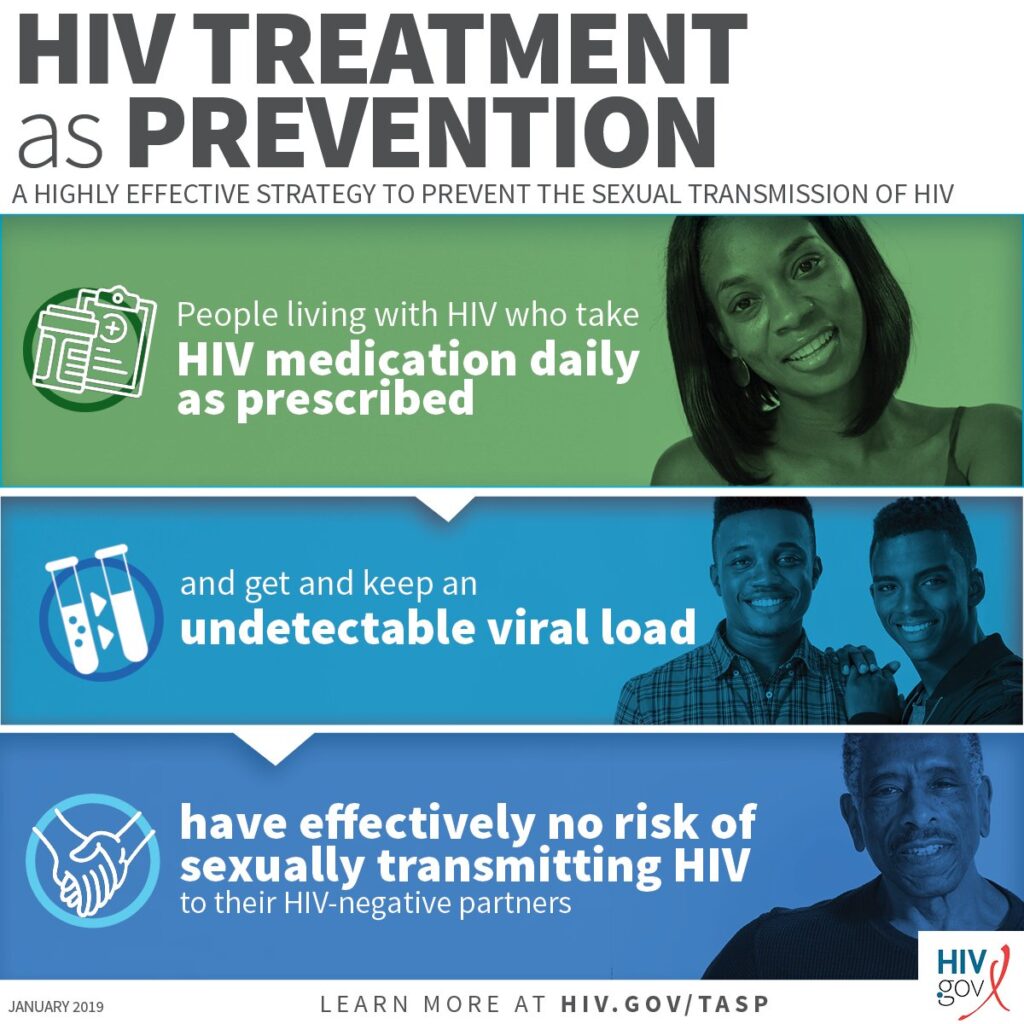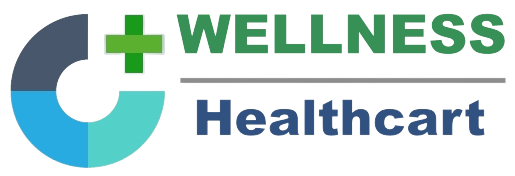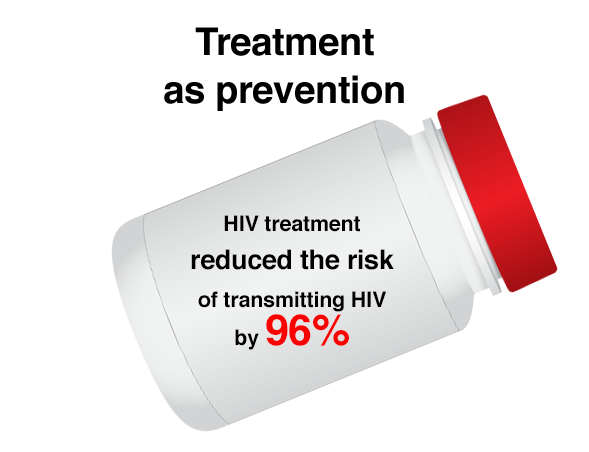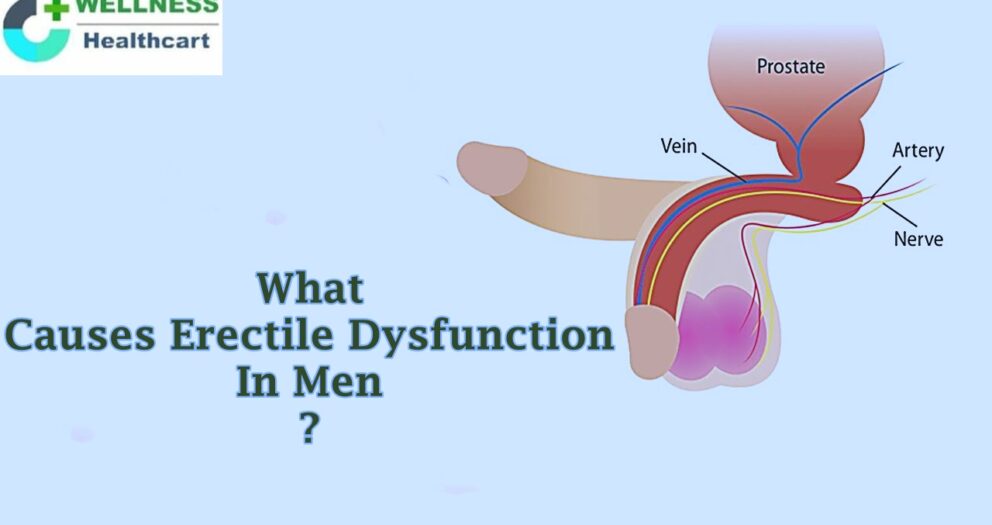Treatment as prevention
(TasP) refers to taking HIV medication to prevent the sexual transmission of HIV. It is one of the highly effective options for preventing HIV transmission. People living with HIV who take HIV medication daily as prescribed and get and keep an undetectable viral load have effectively no risk of sexually transmitting HIV to their HIV-negative partners.
TasP works when a person living with HIV takes HIV medication exactly as prescribed and has regular follow-up care, including regular viral load tests to ensure their viral load stays undetectable.
Taking HIV Medication to Stay Healthy and Prevent Transmission
If you have HIV, it is important to start treatment with HIV medication (called antiretroviral therapy or ART) as soon as possible after your diagnosis.
If taken every day, exactly as prescribed, HIV medication can reduce the amount of HIV in your blood (also called the viral load) to a very low level. This is called viral suppression. It is called viral suppression because HIV medication prevents the virus from growing in your body and keeps the virus very low or “suppressed.” Viral suppression helps keep you healthy and prevents illness.
If your viral load is so low that it doesn’t show up in a standard lab test, this is called having an undetectable viral load. People living with HIV can get and keep an undetectable viral load by taking HIV medication every day, exactly as prescribed. Almost everyone who takes HIV medication daily as prescribed can achieve an undetectable viral load, usually within 6 months after starting treatment.
There are important health benefits to getting the viral load as low as possible. People living with HIV who know their status, take HIV medication daily as prescribed, and get and keep an undetectable viral load can live long, healthy lives.
There is also a major prevention benefit. People living with HIV who take HIV medication daily as prescribed and get and keep an undetectable viral load have effectively no risk of sexually transmitting HIV to their HIV-negative partners.
Keep Taking Your HIV Medication to Stay Undetectable
HIV is still in your body when your viral load is suppressed, even when it is undetectable. So, you need to keep taking your HIV medication daily as prescribed. When your viral load stays undetectable, you have effectively no risk of transmitting HIV to an HIV-negative partner through sex. If you stop taking HIV medication, your viral load will quickly go back up.
If you have stopped taking your HIV medication or are having trouble taking all the doses as prescribed, talk to your health care provider as soon as possible. Your provider can help you get back on track and discuss the best strategies to prevent transmitting HIV through sex while you get your viral load undetectable again.

How Do We Know Treatment as Prevention Works?
Large research studies with newer HIV medications have shown that treatment is prevention. These studies monitored thousands of male-female and male-male couples in which one partner has HIV and the other does not over several years. No HIV transmissions were observed when the HIV-positive partner was virally suppressed. This means that if you keep your viral load undetectable, there is effectively no risk of transmitting HIV to someone you have vaginal, anal, or oral sex.
Talk to Your Partner
Talk about your HIV status with your sexual partners and decide together which prevention methods you will use. Some states have laws that require you to tell your sexual partner that you have HIV in certain circumstances.
Other Prevention Benefits of HIV Treatment
In addition to preventing sexual transmission of HIV there are other benefits of taking HIV medication to achieve and maintain an undetectable viral load:
- It reduces the risk of mother-to-child transmission from pregnancy, labor, and delivery. If a woman living with HIV can take HIV medication as prescribed throughout pregnancy, labor, and delivery and if HIV medication is given to her baby for 4-6 weeks after delivery, the risk of transmission from pregnancy, labor, and delivery can be reduced to 1% or less. Scientists don’t know if a woman living with HIV who has her HIV under control can transmit HIV to her baby through breastfeeding. While it isn’t known if or how much being undetectable or virally suppressed prevents some ways that HIV is transmitted, it is reasonable to assume that it provides some risk reduction.
- It may reduce HIV transmission risk for people who inject drugs. Scientists do not yet know whether having a suppressed or undetectable viral load prevents HIV transmission through sharing needles or other injection drug equipment, but it is reasonable to assume that it provides some risk reduction. Even if you are taking HIV medication and are undetectable, use new equipment each time you inject and do not share needles and syringes with other people.
ALSO CHECK:







Write a comment
You must be logged in to post a comment.